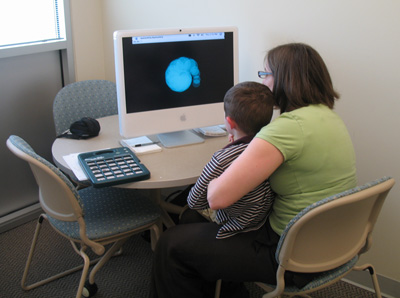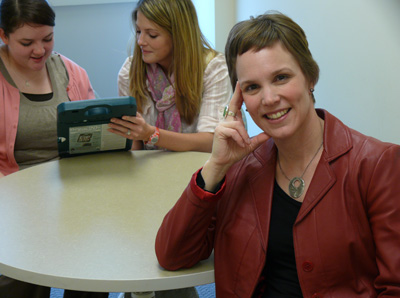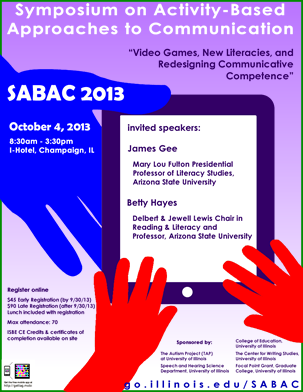

Professor DeThorne and two graduate students in Speech-language Pathology (right)
Current Event
October 4, 2013: Symposium on Activity-Based Approaches to Communication
This is a one-day symposium focusing on play-based communication and social interaction designed to be of interest to clinicians, teachers, researchers and caregivers.
"Video Games, New Literacies, and Redesigning Communicative Competence"
Invited Speakers
James Paul Gee
James Paul Gee is the Mary Lou Fulton Presidential Professor of Literacy Studies at Arizona State University. He is a member of the National Academy of Education. His books include: Sociolinguistics and Literacies (Fourth Edition 2011); An Introduction to Discourse Analysis (Third Edition 2011; What Video Games Have to Teach Us About Learning and Literacy (Second Edition 2007); How to Do Discourse Analysis (2011); Woman as Gamers: The Sims and 21st Century Learning (2010) and Language and Learning in the Digital World (2011), both written with Elizabeth Hayes. The Anti-Education ERA: Creating Smarter Students through Digital Media appeared in 2013. Prof. Gee has published widely in journals in linguistics, psychology, the social sciences, and education.
Elisabeth R. Hayes
Elisabeth R. Hayes is Professor and holds the Delbert & Jewell Lewis Chair in Reading & Literacy at Arizona State University. She has published widely on the topics of literacy, gender, gaming, and learning; her recent books include Women and Gaming: The Sims and 21st Century Learning (2010), Language and Learning in a Digital Age (2011), both co-authored with James Gee, and Learning in Video Gaming Affinity Spaces (2012) (co-edited with Sean Duncan). Prof. Hayes is currently the co-director of Play2Connect, a research and outreach project that aims to promote intergenerational learning, communication, and well being through video games. One of her current studies is an investigation of how joint media engagement in Hispanic families, particularly around games, might enhance literacy development and problem solving skills.
Sponsors
- Speech and Hearing Science Department, University of Illinois
- Focal Point Grant, Graduate College, University of Illinois
- College of Education, University of Illinois
- The Center for Writing Studies, University of Illinois
- The Autism Program (TAP) of University of Illinois
Symposium Schedule
| 8:30-9:00 am | Registration and Continental Breakfast |
| 9:00-9:45 am | Welcome: Dr. Julie Hengst and Dr. Laura DeThorne, SABAC organizers Keynote: New Literacies in the 21st Century Presenter: Dr. Mary Kalantzis, Dean of College of Education |
| 9:45-10:00 am | Break |
| 10:00-11:30 am | Session I: Literacy in a Digital World Presenter: Dr. James Gee Books are a technology that we know a lot about. Digital media are new technologies. So far we have pretty much ignored what we know about literacy in our studies of issues of learning and equity surrounding digital media. This is a bad mistake unless you want to perpetuate inequality. |
| 11:30-11:45 am | Lunch Break: time to pick up boxed lunches |
| 11:45 am-1:15 pm | Lunch Small Group Sessions (see below for details) 11:45-12:00 Presentation by group facilitators 12:00-12:30 Group discussion on group topic 12:30-12:45 Break 12:45-1:15 Report-Out (led by Dr. Betty Hayes) |
| 1:15-2:30 pm | Session II: What Video Games Have to Teach Us about Discourse Presenter: Dr. James Gee Discourse analysis so far is a part of linguistics that applies to language in use. I will argue that games can teach us we have misconstrued the nature of language, discourse, and conversation. |
| 2:30-3:00 pm | Questions, Discussion, and Closing Remarks Presenter: Dr. Elizabeth Hayes Thank you for coming: Dr. Julie Hengst & Dr. Laura DeThorne |
Lunch Small Group Sessions
Title: Using Technology to Maximize Literacy Skills in Individuals Using AAC
Facilitator: Tracy S. Gunderson, M.S. CCC-SLP, Clinical Instructor in Speech and Hearing Science, University of Illinois
Description: The development of literacy skills is critical to compete in the educational system, job market and for leisure activities. Individuals that use AAC may have difficulty developing writing and reading skills. The use of electronic books, software, computers and communication devices can be essential components to literacy development. What resources are available to parents, teachers, and consumers? This discussion will look at some of the tools and approaches that are being used successfully for literacy skill development.Title: AAC and Multiliteracies: Creating a Nexus for Opportunity
Facilitator: Charis Lauren Price, Ph.D. Student in Early Childhood Special Education, University of Illinois
Description: Multiliteracies is a term coined by the New London Group (1996) that calls for a need to unveil the diversity of our literacy practices. Traditional study of literacy focuses on isolated skills, such as coding and decoding of written words. Multiliteracies, however, highlights the multi-modal nature of literacies and the whole range of practices involved in using texts This lunch session will focus on the importance of understanding Alternative & Augmentative Communication (AAC) within a multiliteracy framework. We will endeavor to understand how to view AAC and multiliteracies through a “both-and” lens, as opposed to an “either-or” approach.-
Title: Technology and CSD: Device Apps in Clinical Practice
Facilitator: Naomi Gurivich, PhD CCC-SLP
Description: This lunchtime discussion will address the general benefits, and identify caveats, of using mobile apps in clinical practice. Additionally, we will outline types of useful applications with an aim towards (1) helping us sift through the multitude of available apps; and (2) getting the most out of this resource. -
Title: Engineering Challenges of mediating talk
Facilitators: XiSong, Yang, Dr. Mark Hasegawa-Johnson, ECE. -
Title: Summit Afterschool Program
Facilitators: Andrew Moss, MiKyung, Chuck Jackson, Megan-Brette Hamilton
Description: This group will present our perspectives on developing Summit Afterschool Program, which serves public school children of diverse linguistic abilities and cultural backgrounds. We will discuss the benefits and challenges of incorporating many different kinds of “diversity” – cultural, linguistic, racial, and language ability – into one program, and focus on the ways technology plays a role in our activities and goals. -
Title: Mediating Real-World Communication Environments
Facilitators: Katie, Hillary, Maeve, Mariana -
Title: Multimodality—in talk, text, and practice.
Facilitator: Dr. Paul A. Prior, CWS
Location:
i-Hotel and Conference Center (tentative) * 1900 S. First Street * Champaign IL 61820
Continuing Education Credits should be available for:
- Educators (ISBE)
Certificates of completion vailable upon request
Cost:
- $45 early registration (received by 9/30/2013)
- $90 late/at the door registration
Maximum attendance 70 people
To Register:
- Register online
- You will be emailed a copy of your form. Print it and mail along with your payment to the address below.
- Make checks payable to: University of Illinois
Focal Point Symposium
Department of Speech and Hearing Science
901 S. Sixth Street
Champaign, IL 61820
Attn: Julie Hengst
If you have any questions, please contact one of us:
- Julie Hengst, Associate Professor, 217-244-6149, hengst@illinois.edu
- Laura DeThorne, Associate Professor, 217-333-2230, lauras@illinois.edu

